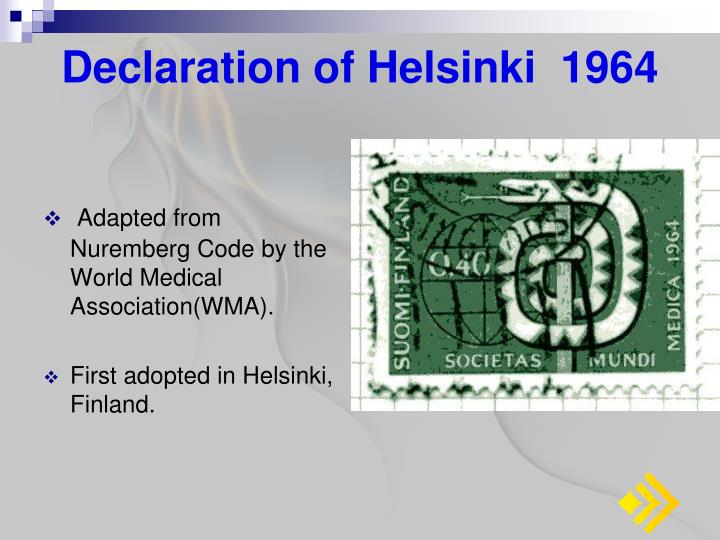

The investigator or the investigating team should discontinue the research if in his/her or their judgment it may, if continued, be harmful to the individual. The Declaration of Helsinki is a statement outlining the ethical principles of medical research involving human subjects, originally adopted at the 18th Congress of the World Medical Association in Helsinki, Finland, in June 1964. The subjects should be volunteers - either healthy persons or patients for whom the experimental design is not related to the patient's illness. It is the duty of the physician to remain the protector of the life and health of that person on whom biomedical research is being carried out. The objective being the acquisition of new medical knowledge, only to the extent that medical research is justified by its potential diagnostic or therapeutic value for the patient.

The first version was adopted in 1964 and has been amended seven times since, most recently at the General Assembly in October 2013.

If the physician considers it essential not to obtain informed consent, the specific reasons for this proposal should be stated in the experimental protocol for transmission to the independent committee. The Declaration of Helsinki (DoH) is the World Medical Association’s (WMA) best-known policy statement. No experiment should be conducted where there is an a priori reason to believe that death or disabling injury will occur. And contrary to the Nuremberg Code, the Declaration permits experimentation on individuals who are unable to exercise their right to informed consent including children. The refusal of the patient to participate in a study must never interfere with the physician-patient relationship. The Declaration of Helsinki does not require written informed consent when experimental treatment is combined with medical care. The potential benefits, hazards and discomfort of a new method should be weighed against the advantages of the best current diagnostic and therapeutic methods.Įvery patient - including those of a control group, if any - should be assured of the best proven diagnostic and therapeutic method.
#Declaration of helsinki free
The physician must be free to use a new diagnostic and therapeutic measure, if in his or her judgement it offers hope of saving life, re-establishing health or alleviating suffering. It was first adopted in 1964 (Helsinki, Finland) and revised in 1975 (Tokyo, Japan), 1983 (Venice, Italy), 1989 ( Hong Kong ), 1996 (Somerset-West, South Africa) and 2000 (Edinburgh, Scotland). World Medical Association adopted guiding principles for conducting human subject research. World Medical Association, Declaration of Helsinki: Recommendations Guiding Physicians in Biomedical Research Involving Subjects (1964 1975 1983. The Declaration of Helsinki (Document 17.C) is an official policy document of the World Medical Association, the global representative body for physicians.


 0 kommentar(er)
0 kommentar(er)
